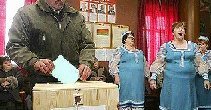Despite the almost non-existing election campaign of the opposition candidate Alexander Milinkevich, the former professor of physics became the symbol and leader of the united opposition. The friendly and trustful looking Professor became in the weeks after the elections a familiarly face on CNN. Belarus was finally on the agenda even on the agenda of the EU-Russia summit. However, what looked liked another coloured revolution ended up as grey as the endless Minsk concrete blocks.
Local elections
A year after Lukashenka has managed to keep status quo, the opposition has started to fight each other again and Europe is rapidly forgetting about the situation in Belarus. The opposition is no longer united around Milinkevich; instead, the oppositions groups are bitterly fighting for power.
In January, Belarus had local elections. Once again, Lukashenka managed to keep control over the local level. Out of 7500 constituencies only around 300 had candidates from the opposition, and only a tiny proportion got elected.
A major reason why the opposition is weak is the absence of young people. During the presidential elections in 2006 the leading force were young people, today many young people from the opposition movement have left Belarus. They took the opportunity to leave Belarus by accepting the many free scholarships offered by EU countries. This has meant that the leading persons from the youth organizations have left Belarus, and there has been no one to take over.
Role of Russia and the EU
Despite the apparent strength of Lukashenka the important Russian support seems to be decreasing. The continuingly bad relation between Lukashenka and Putin came to a new low point when the Kremlin controlled Gazprom in the last days of 2006 threatened Minsk to accept a dramatic increase in gas price. However, in the end of the day it is not likely that Kremlin is going to support changes in Belarus.
Therefore, the only hope Belarus has is support from the EU. The democratic forces need more than just kind words and invitations for tea in Brussels. The EU must offer Belarus a perspective for EU membership providing that Belarus is fulfilling the Copenhagen criteria. This would provide the opposition with a real alternative to Lukashenka and his dictatorial rule. For the EU it does not take much effort, but it would be a major step forward for Belarus and a strong signal to the rest of the region.


Follow the comments: |
|
